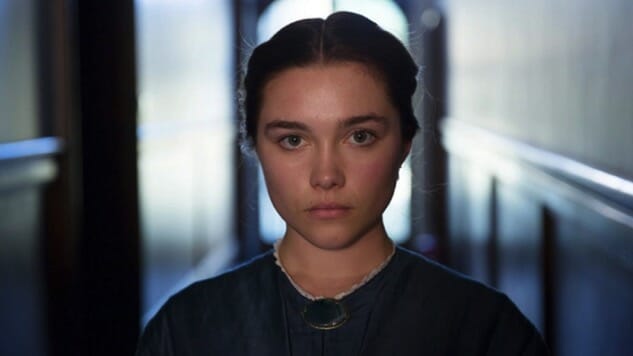Lady Macbeth

Perhaps it’s best not to read the literary inspiration for Lady Macbeth, Nikolai Leskov’s 1865 novella The Lady Macbeth of Mtsensk, before watching the film. Doing so will only accentuate the kind of psychological acuity that is sorely missing from William Oldroyd’s vacuous adaptation. Though Oldroyd and screenwriter Alice Birch have transposed Leskov’s novella from 19th-century Russia, to 19th-century England, the characters and situations are basically the same. Katerina Ismailov has become Katherine (Florence Pugh), and she’s still trapped in a loveless arranged marriage to gruff Alexander (Paul Hilton). She finds a deliverance from her boredom in farmhand Sebastian (Cosmo Jarvis), with whom she carries on a torrid love affair that she eventually tries to hold onto by committing a series of murders against the family members that have suppressed her. And Lady Macbeth explores many of the same themes of Leskov’s work—in particular, the stifling effect that patriarchal norms have on women who are expected to be little more than subordinates to their husbands and bearers of their children, and the way this particular female descends into violent amorality in her bid to challenge such expectations.
Much of the first half of Lady Macbeth does generate a certain delicious black-comic frisson from seeing Katherine become ever bolder in lashing out against the societal strictures imposed on her. Pugh, in her first leading film role, surely deserves a lot of credit for this, bringing a palpable girlishness to her fractious behavior—like a kid getting a dirty thrill from being naughty—that gives the film a subversive edge that is sometimes enlivening. But Oldroyd, a theater director making his feature filmmaking debut, adds to the black-comic aura with his extremely poised and precise filmmaking, alternating between impeccably framed stationary shots to convey Katherine’s sense of imprisonment and handheld camerawork during her freer moments. Seeing Katherine gleefully commit her transgressions toward “polite” society within the calm of Ari Wegner’s camerawork gives Lady Macbeth the feel of a passionate modern character fighting the stylistic restrictions of a staid period drama.